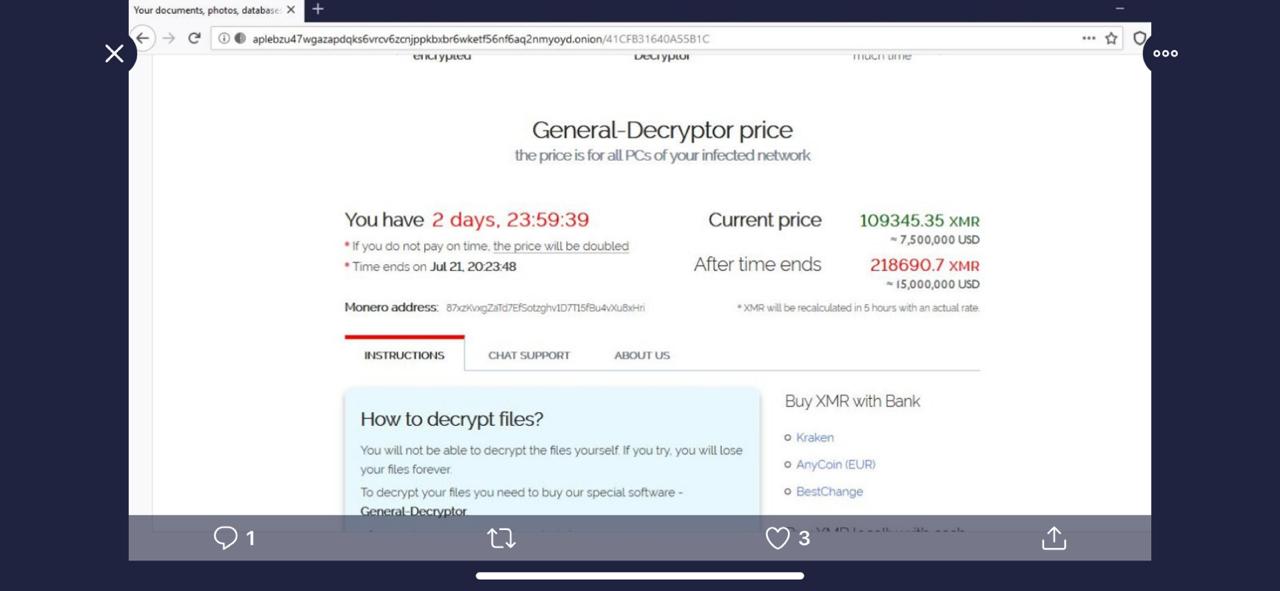Several cryptocurrency proponents on Twitter have reported that the largest telecommunications company in Argentina called Telecom has become a victim of a ransomware attack. Despite being unknown so far, the perpetrators have demanded a .5 million ransom to be paid with the privacy coin – Monero (XMR).Telecom Hacked For Monero?Founded in 1990, Telecom has become the largest telecommunication firm in Argentina. According to popular cryptocurrency analyst and proponent, Alex Kruger, and a few other community members, the company was attacked just recently from an unknown hackers’ group.The information they provided informs that there are no evident effects on users or the company’s services. Landlines, cell phones, and the Internet remain unaffected. However, the perpetrators have
Topics:
Jordan Lyanchev considers the following as important: AA News, argentina, Hacking, security
This could be interesting, too:
Chayanika Deka writes Yuga Labs Secures Major Win as SEC Closes Investigation Without Charges
Andrew Throuvalas writes Bitcoin Soars Back To ,000 After BlackRock CEO Says “Buy The Dip”
Chayanika Deka writes XRP, SOL, and ADA Inclusion in US Crypto Reserve Pushes Traders on Edge
Chayanika Deka writes Why Arthur Hayes Is Bullish on Bitcoin Under Trump’s Economic Strategy
Several cryptocurrency proponents on Twitter have reported that the largest telecommunications company in Argentina called Telecom has become a victim of a ransomware attack. Despite being unknown so far, the perpetrators have demanded a $7.5 million ransom to be paid with the privacy coin – Monero (XMR).
Telecom Hacked For Monero?
Founded in 1990, Telecom has become the largest telecommunication firm in Argentina. According to popular cryptocurrency analyst and proponent, Alex Kruger, and a few other community members, the company was attacked just recently from an unknown hackers’ group.
The information they provided informs that there are no evident effects on users or the company’s services. Landlines, cell phones, and the Internet remain unaffected. However, the perpetrators have targeted and encrypted multiple Telecom-owned Windows computers that contain sensible and personal information.
To provide the decryption software, the unknown attackers have requested a ransom paid in the popular privacy coin – Monero. One of the screenshots notes that Telecom has until July 21st, 20:23 local time to pay 109,345.35 XMR (worth $7.5 million at those prices). If the company fails to transfer the funds within the given timeframe, the amount doubles to 218690.7 XMR ($15 million).

Interestingly, the perpetrators have also presented guidance on how Telecom representatives can purchase Monero coins, the screenshot reveals.
By executing ransomware attacks, the hackers infiltrate individuals, companies, or organizations and encrypt sensible information. Later, they request the victims to pay a ransom, and they provide the necessary encryption tools to regain access.
Is It REvil?
Despite no hackers’ group taking responsibility for the hack so far, several signs point towards one of the most popular organizations in the field – REvil. Firstly, the group became famous for carrying out similar ransomware attacks. For instance, the London-based exchange company Travelex recently became a victim of REvil and had to pay $2.3 million in Bitcoin.
However, the second sign seems even more enticing. After the Travelex hack, REvil said that they will seize requesting ransoms in BTC as it leaves trails. Instead, the group announced switching their primary demand currency to precisely Monero.
REvil asserted that the combination between the privacy coin and the anonymous browser Tor could “quite successfully make a person’s financial activity completely invisible to the police and government agencies. We are extremely worried about the anonymity and security of our adverts, so we began a “forced” transition from the BTC to Monero.”
